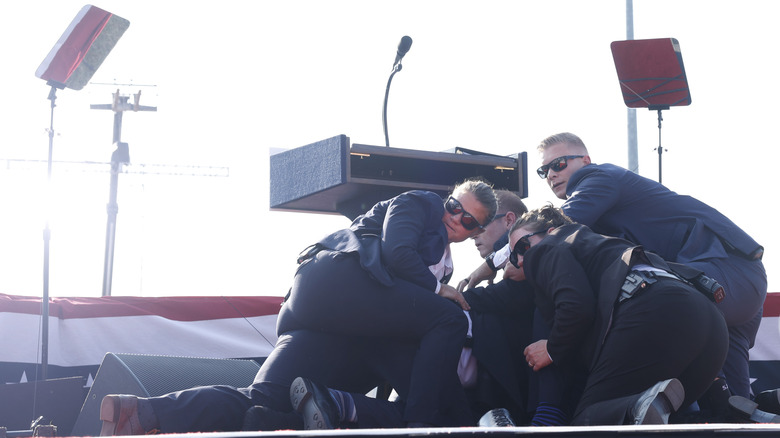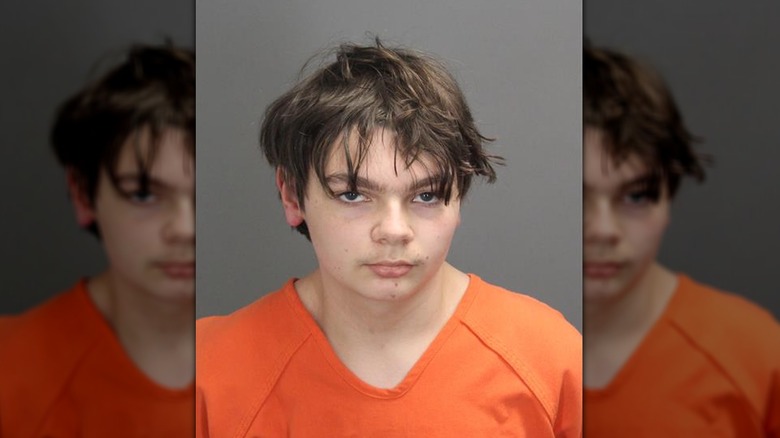The Big Question That Still Needs To Be Answered About Donald Trump's Would-Be Assassin
At least some of the gaps in Thomas Matthew Crooks' life story have gotten filled in since his failed assassination attempt on former president Donald Trump in July 2024. We've learned that he was a smart, quiet student. That he was a dependable worker at his job in a transitional care facility. That his politics, to the extent he had strong convictions, were not publicly aired but have been anecdotally reported as right-leaning. We know that the Trump campaign targeted Crooks's family as potential swing voters who could be swayed on gun rights in 2016. And it appears that he was able to pull off his attempt on Trump's life due to significant missteps on the part of the Secret Service.
But still missing from the picture is the shooter's motive. Crooks' nebulous political views don't offer any immediate reason for his actions, and he didn't leave much of an online trail. Handwritten evidence at his home was also scant. But an investigation of Crooks' devices showed that he had not only researched Trump's publicly scheduled appearances, but also the 2024 Democratic National Convention. He had photos of several high-profile politicians on his phone, including President Joe Biden.
Based on that, it's been suggested that Crooks wanted to pull off an assassination — any assassination — of a high profile political figure. The appeal of Trump's July 13 rally, in this interpretation, was that it was held an hour away from Crooks' house. But if proximity was why he chose Trump as a target, it still doesn't explain why he wanted to commit an assassination in the first place.
He researched other mass shooters and major depressive disorder
Political rallies and presidential contenders weren't all that Thomas Matthew Crooks researched before he tried to kill Donald Trump. He'd done his research on building explosives, like the one found in his car after the shooting. And among the photos in his phone was one of Ethan Crumbley, the boy who killed four students at Michigan's Oxford High School in 2021 when he was just 15. Crumbley received life without parole for his crimes — the first minor to be so sentenced after a 2012 Supreme Court ruling severely curtailed the use of the life sentence on minors. Not only that, but his parents received 10 years for involuntary manslaughter based on their inability and unwillingness to prevent their son's actions.
It's common for mass shooters to have researched others who have committed such crimes, according to law enforcement experts. In light of the photo found on Crooks' phone, some speculated that he looked to Crumbley as a mentor for what he planned to do. In addition to Cumbley's mugshot being saved on his phone, Crooks had run web searches on Crumbley and his parents.
Crooks was also running searches on mental health before his attack. Investigators found that he'd sought information on major depressive disorder and depressive crisis treatment. But if Crooks did experience a mental health disorder, it was undiagnosed at the time of his death.
Crooks seems to be unusual for a mass shooter and a would-be assassin
As of July 2024, investigation into Thomas Matthew Crooks remains in its early stages. The lack of speedy answers has led to tension between the FBI and lawmakers from both houses of Congress. But clear answers regarding Crooks' motive may never emerge. A decades-long Secret Service study into successful and attempted political assassinations found no accurate "profile" could be assembled to describe a typical assassin's motives. While Crooks fit the sex and racial demographics of most high-profile assassins, he was unusually young and lacked any clear ideological convictions or long-nursed grievances.
In his youth and choice of weapon, Crooks more resembles the perpetrators of mass shootings. He has some superficial similarities to Ethan Crumbley, whom he researched, and Adam Lanza, the killer behind the Sandy Hook tragedy who also murdered his mother. But there too, attempts to fit Crooks into an easy profile are frustrated by what we know of his life. Crooks, unlike Lanza, was a good student, had a good relationship with his parents, and had plans to head off to university in the fall of 2024.
More on Crooks' life and motive may well be revealed in time. Some of his predecessors in infamy, like Lanza, were adept at covering their tracks. But Crooks is far from the only assassin or attempted killer in history whose motives remain unclear. The expectation that there would be a driving, comprehensible reason for these people to act as they did is understandable, but in many cases, there is no such clarity.


